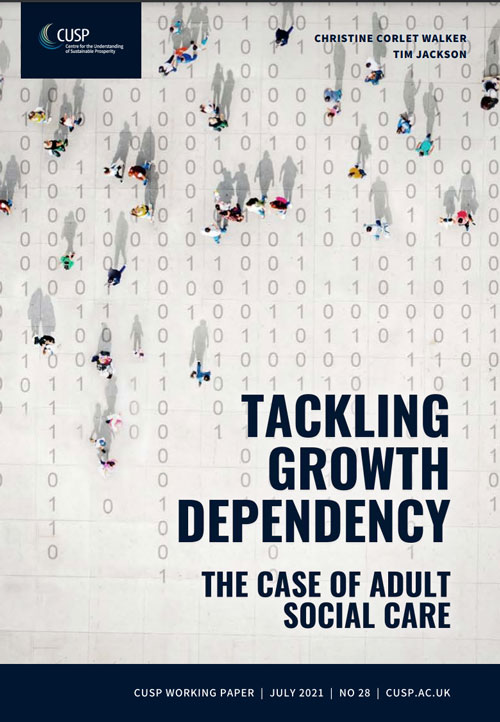Christine Corlet Walker and Tim Jackson
CUSP Working Paper Series | No 28
Summary
Our current economic system depends on growth to function effectively. Several recent reports have aimed to understand this growth dependency and have sought ways to mitigate it. In light of the long-term slowdown in the growth rate already witnessed in advanced economies and the potential threats to economic growth from climate change, biodiversity loss and social disruption, such strategies are fully consistent with economic prudence.
In many ways, the UK’s adult social care sector represents a microcosm of the growth dependencies observed in the wider economy. The rising demand for adult social care associated with an ageing population creates a dependency on ever-growing production of health and social care services. Rising costs, related to the time-intensive nature of social care, demand growing revenues for care companies to stay afloat. And the use of predatory financial practices by investment firms places unmanageable ongoing financial costs on large parts of the sector.
These growth dependencies can be attenuated or aggravated by physical, financial, legislative, and social factors. The privatised structure of adult social care, combined with an absence of effective financial legislation, creates the conditions that expose care companies to overleveraging, among other risks. Tackling these underlying structures—e.g. through strict financial regulations—would not only reduce the growth dependency of the adult social care sector but would also generate other co-benefits, such as reduced inequality.
The processes and structures creating growth dependency in adult social care apply to other parts of the welfare state too. In this report, we therefore present a systematic approach to identifying, analysing and transforming growth dependencies in the welfare state. Using adult social care as our case study, we explore how growing demand, rising costs and rent seeking can create growth dependencies. We analyse the structures that drive and reinforce these growth dependencies and, in so doing, we identify fruitful levers for transformation and mitigation.
The systematic application of this framework to all parts of the welfare state would enable us to protect the resilience of the welfare state and improve the wellbeing of UK citizens, no matter what is happening to growth. Specifically, this report calls on HM Government:
- to establish a formal inquiry into growth dependencies across the welfare state and to develop a precautionary strategy for mitigating the risks that arise from them.
In relation to the adult social care sector, the paper recommends that HM Government should:
- accelerate proposed reforms to adult social care and expand their remit urgently to address the pressures created by rising demand, rising costs and rent-seeking behaviours;
- enact legislation to protect the wages of care sector workers and the quality of social care against predatory financial practices;
- develop and support innovative ownership models that break the link between property speculation and the financial stability of the adult care system.
Working Paper
You can read the paper online on the CUSP website or download in pdf (1.7MB) | Corlet Walker C and T Jackson 2021. Tackling growth dependency—the case of adult social care. CUSP Working Paper No 28. Guildford: Centre for the Understanding of Sustainable Prosperity.
Policy Briefing
A policy briefing was also produced from this work for the UK All-Party Parliamentary Group on Limits to Growth—launched on 13 July, 3pm (BST), with Prof Emma Dowling, Prof Hermann Ott, Christine Corlet Walker and Prof Tim Jackson. Details via the APPG website.

